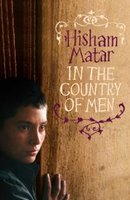 I don't feel that I so much read Hisham Matar's Booker shortlisted In the Country of Men as watched it.
I don't feel that I so much read Hisham Matar's Booker shortlisted In the Country of Men as watched it.The movie in my head was one of those moody art-house things full of meaningful glances which hinted at unspoken words, secrets whispered in corners, and long poignant silences. It was shot in black and white, and the scenes alternating between the claustrophobic dark of interiors and the searing brilliance of the sunlight which bleaches everything of its colour.
I felt so opressed by the weight of fear in this nailbitingly tense novel that I had to put it down for two whole days (although I had gobbled down the first half of it on the AirAsia flight back from Bali.)
It's set in Libya. It didn't have to be. It could be set in any police state where there is the inevitable anticiption of the knock on the door and the possibility of torture, imprisonment. And worse. One of the most disturbing scenes in the book is an account of the public hanging of a gentle art historian shown on state TV.
The story is told through the eyes of Sulaiman a nine year old boy who struggles to make sense of what is going on around him. His father, Baba, is one of the liberal intelligensia fighting for democratic reform. He is frequently absent from home, ostensibly on business trips but in reality on attempts to foment social change and a push for democracy among the student population.
His wife and son, meanwhile, are vulnerable and afraid at home. Suleiman's mother takes refuge in alcholol, procured illegally from the local baker. She tells Suleiman that it is her "medicine", and spends the evenings relating 1001 Nights and her own story of domestic tyranny - both tales in which women are treated as mere chattels. She was at 14 forced into marriage against her will because she had spoken to a boy in public.
The strain of witnessing so much that he does not understand carries Suleiman to breaking point.
He longs for an initiation into the world of men, principally so that he can protect his mother, whom he loves almost incestuously. But childhood innocence is lost as he discovers the power of siding with the enemy and bullying those weaker than himself. Violence and betrayal suck him in.
The Bookseller reports that the novel :
... is already characterised in book trade shorthand as "the Libyan Kite Runner" ...but I found this novel very much stronger, and a great deal more disturbing, without The Kite Runner's easy answers and the blare of Hollywood sentimentality.
Like Hosseini's novel, In the Country of Men contains strong autobiographical elements. Matar fled with his family from Libya to Egypt where he attended English boarding school.
Would I recommend the novel? Yes. The writing is sensual, the storytelling compelling and powerful. It asks difficult questions about how relationships survive in an atmosphere of oppression and fear and I feel that it fully deserved its place on the Booker shortlist - I'm just glad that I wasn't one of the judges on that committee.
Read the first chapter of the novel here.
2 comments:
burhan - you're right! that's a really weird thing to do - lift a still from a totally different film
Hi, Sharon!
This is another book which is hopefully winging its way to me, even as I type this, but I couldn't resist peeking at your review, you had me with the opening line...
Another great review, thanks!
Post a Comment